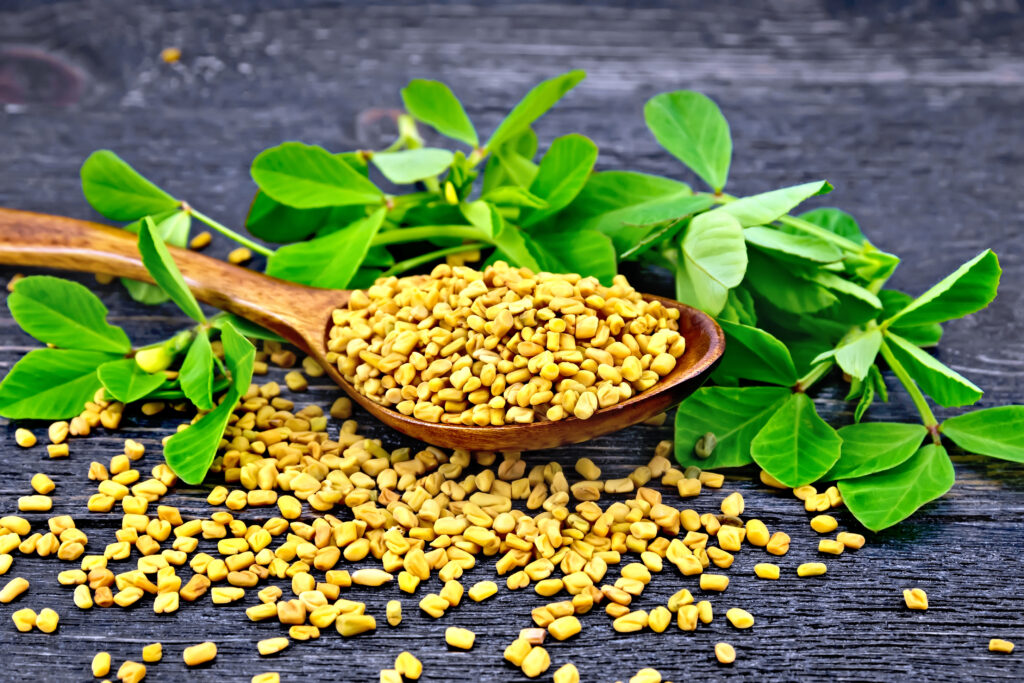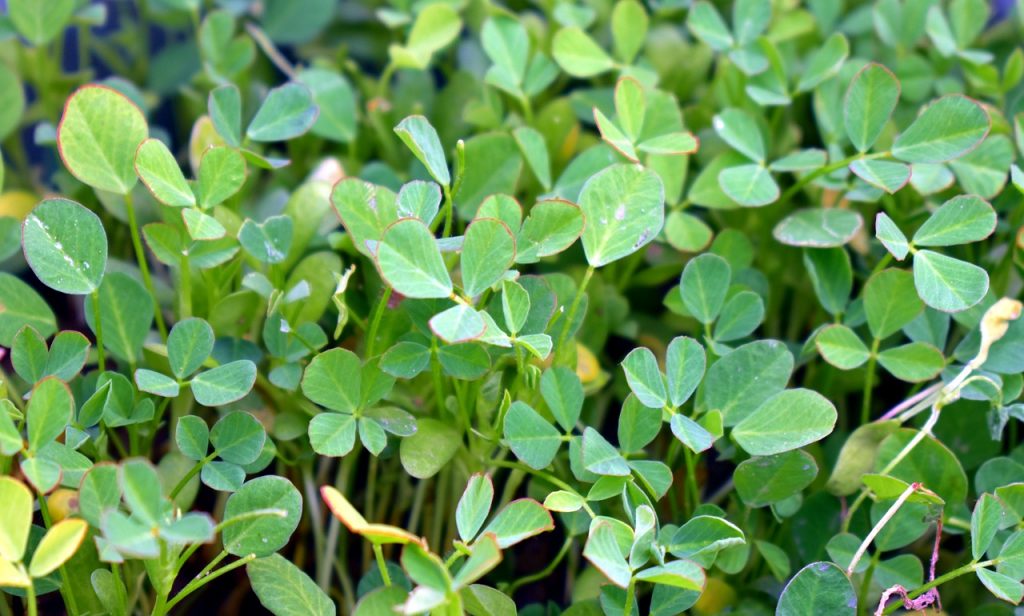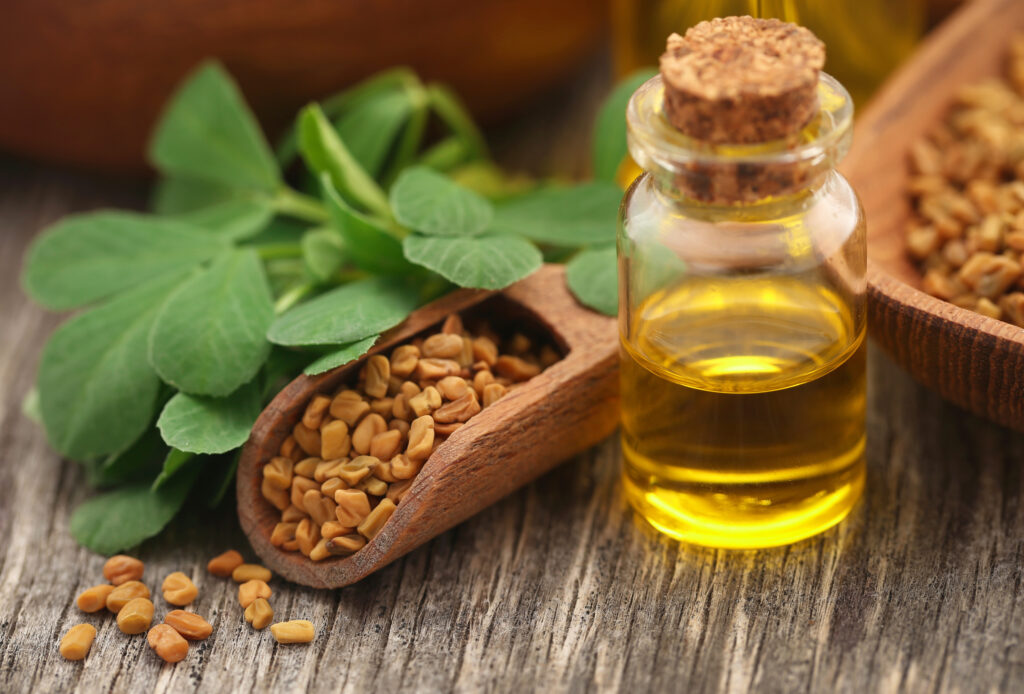Published on April 25, 2018. Last Updated on July 17, 2021.
Fenugreek Hair Effects According to Research Studies: The Fenugreek plant has been harvested since ancient times as a highly prized culinary spice. Its richly flavored seeds and fragrant leaves (kasoori methi) add a rare and exotic flavor note to create savory sauces, lentils, soups, curries, and potatoes (aaloo-methi), and vegetable dishes.
A science journal, Drug Research (Stuttgart), published a review on the therapeutic capabilities of Fenugreek, including the treatment of E.coli, diabetes, and high cholesterol. They attributed these effects to certain phytoconstituents such as saponins, polyunsaturated fatty acids, flavonoids, polyphenols, phosphorous, amino acids, and ascorbic acid. The review also discusses newer treatment and clinical applications, along with the application of nano delivery systems.

Fenugreek seeds have widespread relations with Ayurveda, Unani, and Arabic medicine. The seeds were useful for the treatment and prevention of different ailments. Fenugreek (Trigonella foenum-graecum) or methi is from the Leguminosae family and is primarily known for its anti-diabetic and hypocholesterolemic activities. The germinated fenugreek seeds were used in the treatment of E.coli infection in Germany and France. The important phytoconstituents responsible for such medicinal applications are saponins, polyunsaturated fatty acids, galactomannans, trigonelline, and 4-hydroxy isoleucine. Flavonoids, apigenin 6,8-di-C-glucoside, apigenin-6-C-glucosyl-8-C-galactoside, 6-Cgalactosyl- 8-C-arabinoside are the chief ingredients of fenugreek seeds; responsible for reducing blood glucose while given to diabetic rats, whereas important flavones are apigenin, luteolin, and vitexin. The other major bioactive components in fenugreek seeds are polyphenols like rhaponticin and isovitexin. Fenugreek seeds contain phosphorus and are categorized into different classes, such as inorganic phosphorus, phospholipids, phytates, phosphor-proteins, and nucleic acid. Germinated seeds are profusely filled with amino acids, proteins, ascorbic acid, sugars. Further, this review shares information about the recent therapeutic intervention not covered earlier, in vivo and in vitro, and some clinical applications against certain interesting ailments other than older applications. This review includes certain nano delivery systems of Fenugreek seeds and their medicinal application.
Also, scientists are now discovering the potential of this herb to restore our hair’s overall health and growth quality.
Fenugreek As A Time-Honored, Herbal
Fenugreek is native to different parts of the world, including Egypt, the Middle East, and India. For thousands of years, different cultures have used different parts of this plant to cook a flavorful accent. But even more so, fenugreek has been recognized for its health-boosting properties. It helps fight against inflammation and microbes. It is also regarded as an anti-diabetic, with the ability to curb the development of tumors.
In more recent and modern years, scientists have confirmed Fenugreek’s antimicrobial, antioxidant and anti-inflammation properties. These findings have been summarized by the Journal of Medicinal Plant Research in its report entitled “The Physiological and Pharmaceutical Effects of Fenugreek.”
Your Hair Follicles’ Next Best Friend
Fenugreek seeds, also known as methi, are an abundant source of various micro-nutrients. With concentrated stores of saponins, flavonoids, alkaloids, and phosphates, along with various vitamins and minerals (e.g., copper, manganese, zinc, iron, selenium, and magnesium), these tiny pods offer a uniquely immense potential to revitalize the health of our hair follicles. When these structures are in optimal shape, they are better able to produce healthier hair growth.
Fenugreek May Block DHT
To think that Fenugreek as your hair’s ally may seem like pseudoscience or folklore, something that sounds too good to be true. However, several research studies are proving otherwise. Fenugreek’s densely packed supply of micro-nutrients may work to invigorate our hair follicles’ health and overall functioning. Here are some exciting findings to consider.
One six-month study involved 60 men and women who suffered from mid to late-stage hair loss conditions [1]. Their treatment intervention consisted of taking fenugreek supplements in the form of capsules. Surprisingly, significant percentages of the subjects were able to report noticeable improvements in their hair’s fullness, along with greatly reduced shedding.
So how did these results occur? According to these researchers, fenugreek may increase the supply of blood to the hair follicles. Also, the seeds are known to have high concentrations of natural saponins, which act as DHT inhibitors.
A Possible Natural Alternative to Minoxidil

In a well-known study entitled, Development and Evaluation of Herbal Formulations For Hair Growth, researchers formulated a hair tonic made of four types of different plant extracts — fenugreek being one of them. One particular concentration achieved startling hair growth results in Wistar rats [2]. This included:
- bigger hair follicle size
- longer anagen hair growth stage
Due to these findings, the researchers concluded that their fenugreek-containing formulation could offer a completely natural alternative to the synthetic, FDA-approved hair loss drug known as Minoxidil.
In another study, researchers noted that fenugreek might act as a phytoestrogen, which showed promising hair growth activity in rabbits [3]
Possible Unwanted Effects of Fenugreek
Though Fenugreek is a natural herb, it may still procure adverse side effects, through excessive usage, just like any drug or plant extract used for medicinal purposes. Some possibilities include:
- allergies (i.e., in individuals with nut allergies such as soybeans, green peas, and peanuts)
- reduced blood-sugar levels
- gas
- bloating
- dizziness
- stomach upset
- headaches
Safe dosages for adults have generally been outlined at 2-5 grams per day. Even though Fenugreek is natural, it would still be best to consult with your doctor first, especially if you consider taking supplements with this ingredient. A physician would understand the unique characteristics of your physiological needs and be able to determine whether or not taking Fenugreek would be the right choice for you, or not.
Safety Rating
Skin Deep, a division of EWG (Environmental Working Group), has given fenugreek an impressive rating of 1, representing the lowest possible level for hazardous risks to humans and the environment. Also, the organization has cited the FDA’s assessment of this extract as being safe for use in food, using specific, limited, or even general quantities.
Easy At-Home Fenugreek DIY Recipes
Our ancestors have used fenugreek seeds for culinary, medicinal and health uses [4]. Spending time on easy DIY recipes using Fenugreek seeds is a great way to understand how they are connected to the simple joys presented by the natural botanical world. Here are a few projects that you can try out at home.

Fenugreek Oil
Our ancestors used oil infusions to contain the aromatic and healing essences inherent in the herbs, flowers, and botanicals. Create a simple fenugreek oil by filling a tea strainer with dried seeds. Choose a carrier oil such as olive oil, grapeseed, or safflower oil. Leave overnight in your refrigerator for 1 week. If you prefer a stronger aroma, allow for up to 4-6 weeks or until you are satisfied with the strength of the final scent.
Fenugreek oil can be used on the skin. Alternatively, if you prefer it for culinary uses, it can be used to prepare nutritious soups, salad dressings, or even as a spread on your favorite bread.
Flavored Fenugreek Water Essence
A simple Fenugreek water infusion can be made by covering dried seeds in spring or distilled water. Use a jar or a glass decanter of your choice. Leave the seeds covered in water for about two weeks. Fenugreek water is imbued with a flavor that has been valued since ancient history. In Ayurveda, it is considered a healing tonic used for a wide range of health areas.
Ground Fenugreek Powder
Ground fenugreek seeds are rich in phytonutrients and add a unique flavor to food recipes. Historically, fenugreek powder has been made by hand, using a mortar and pestle. Today, it is possible to use a coffee grinder or a food processor to create a finer consistency. Save your powder in a glass storage container and use it as a topping on yogurt, vegetables, or even your favorite tea or coffee.
Should You Take Fenugreek Orally or Topically?
Due to the insights garnered by modern-day researchers, fenugreek extract is now being incorporated into both topical and oral product supplements. The main benefit offered by topical applications is that it offers a more direct route to the dermis, epidermis, or blood vessels close to the skin’s surface. On the other hand, oral intake allows the main treatment constituents to travel to more body areas through the bloodstream.
Making Decisions For Hair Loss – Choosing A Treatment

The fact that contemporary scientists are finding support for using fenugreek to support healthier hair is certainly exciting. However, it is important to keep in mind that hair loss varies enormously across different individuals.
There are many conditions and diagnoses associated with hair loss, such as:
- genetic pattern baldness and thinning
- alopecia areata
- thyroid imbalances
- telogen effluvium
- traction alopecia
- nutritional deficits
Another factor to consider is the stage of a hair loss condition. At later or more advanced phases, there is a much higher chance that any damage or miniaturization which has affected the hair follicles is irreversible.
Currently, the FDA has only approved two medications that manage androgenic alopecia (i.e., male or female pattern baldness). These include:
- Finasteride
- Minoxidil
However, as with any drug, there are many limitations and possible risks to consider. Chemical constituents travel throughout the bloodstream and negatively impact other parts of the body beyond the treatment areas. Secondly, the research behind these drugs highlights success rates that do not include everyone in the general population. As an example, a study may say that 65% of participants experienced hair growth. But this figure also implies that 35% did not achieve these results. Your particular outcome may align, more or less, with either of the two categories of subjects. It would not be wise to assume that your results would be as successful as everyone else’s.
Natural Skin and Hair Beauty Products Containing Fenugreek

Fenugreek has come a long way from being just a fragrant, medicinal culinary spice. And today, it is no longer just an herbal used in someone’s grandmother’s fix-all recipe for colds, the flu, and other ailments. Fenugreek is now being used by many of today’s chic, forward-moving natural beauty brands. Here are just a handful of examples.
Hair
- Conditioning Detangler by Kingdom Crown
- Regeneration Hair Mask by Belle Bar Organics
- Hair Wellness Moisturizing Lotion, Pomade, and Dietary supplements by Dr.UGro Gashee
Skin
- Ayurvedic Facial Scrub by AnnMarie Skin Care
- Javanese Lulur Body Scrub by JAMU
Just because a natural beauty product contains fenugreek does not necessarily offer the fullest possible benefits of the botanical. As a product ingredient, a plant extract would need to be processed as minimally as possible to retain its inherent bioactive treatment properties for our hair, skin, and other health and beauty needs.

VIDEO: Reversing Hair Problems With A Fenugreek-Containing Hair Lotion
Dr.UGro Gashee is an all-natural hair wellness product line that contains fenugreek as one of its carefully chosen plant-based ingredients. Laura, shown in the video below, explains how fenugreek containing Gashee helps resolved her hair problems.
Fenugreek – One of the Ingredients Cited In Research Publication on GASHEE Topical
Case Studies in Dermatological Medicine featured Dr.UGro Gashee’s topical formulation in a report. Fenugreek is one of the ingredients mentioned. Five patients representing different forms of alopecia used GASHEE and experienced significant and life-changing improvements. The report entitled “A Multimodal Hair Loss Treatment Strategy Using a New Topical Phytoactive Formulation” also discusses the multifaceted nature of hair loss conditions and the need to address more than one target. This cannot be accomplished using synthetic drugs. However, since plants contain multiple variations of a single active treatment molecule and other beneficial compounds, they can offer a better and safer solution.
Frequently Asked Questions on Using Fenugreek for Hair Loss
Should I supplement my meals with fenugreek seeds for hair growth and improvements?
Consuming fenugreek seeds alone or using them as a spice for meals is not likely to improve hair growth. The research studies discussed the above-used fenugreek alongside other ingredients. Furthermore, they did not specify if results from fenugreek could be used for specific types of hair loss cases.
If you decide to add more fenugreek to your diet, focus on general health benefits, not simply grow more hair.
Will fenugreek powder for hair loss actually work?
Fenugreek powder for hair loss is usually sold as gel capsules. However, keep in mind that the drying process needed to produce the powdered form of fenugreek may change or alter some of the original properties. If you choose to adopt it into your daily regimen, it may be taken as a general health supplement instead of a hair growth treatment. Anytime you decide to add supplements to your diet, it is best to do so under the guidance of your physician.
Is it better to consume fenugreek extract or use a topical product containing this as an ingredient?
Taking fenugreek orally will affect other areas of the body, not just the follicles. As it passes through the digestive tract, it travels throughout your bloodstream.
A more direct route to the follicles may be possible through a carefully designed topical hair product with the fenugreek extract. Such topical formulations (Creams, lotions, serums, oils, pomades, ointments) help improve the scalp environment for healthier hair. Topical applications offer a more straightforward path to the treatment area. Preferably topicals should also include safe penetrating enhancers for efficient and effective delivery of fenugreek to the target hair follicle cells.
References
- Schulz C, Bielfeldt S, Reimann J. Fenugreek + micronutrients: efficacy of a food supplement against hair loss. Cosmetic Medicine 2006;27(4): ISSN 1430-4031.
- Purewal L, Gupta SPBN, Milind Pande S. Development and evaluation of herbal formulations for hair growth. E-Journal of Chemistry
2008;5(1):34-8. - Wijaya H, Murlim A, Djajadisastra J. Effectiveness test of fenugreek seed (Trigonella foenum-graecum L.) extract hair tonic in hair growth activity. International Journal of Current Research 2013;5(11):3453-60.
- Moradi korn, Moradi K. Physiological and pharmaceutical effects of Fenugreek (Trigonella foenum-graecum L.) as a multipurpose and valuable medicinal plant. Global
Journal of Medicinal Plant Research 2013;1(2):199-206. - Umar S. and Carter M. A Multimodal Hair-Loss Treatment Strategy Using a New Topical Phytoactive Formulation, Case Reports in Dermatological Medicine / 2021
Further Reading
Learn how grape seed extract can benefit your hair and body
